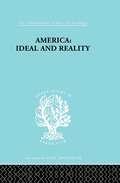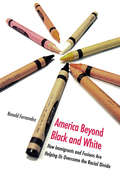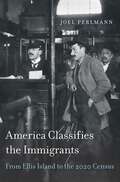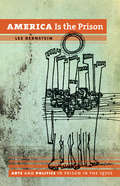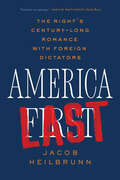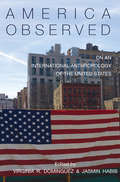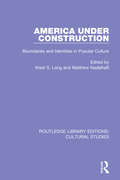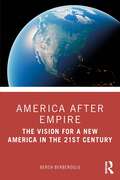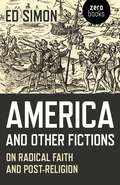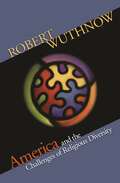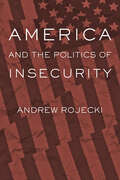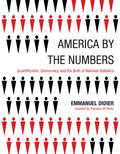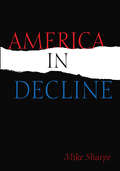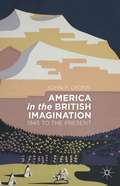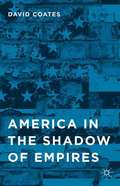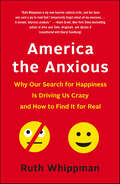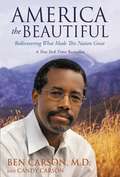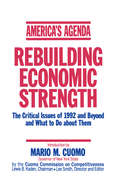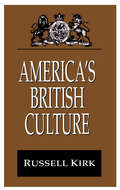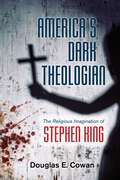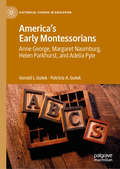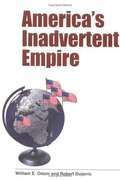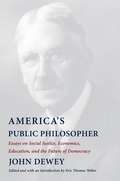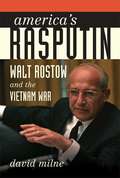- Table View
- List View
America - Ideal and Reality: The United States of 1776 in Contemporary Philosophy (International Library of Sociology)
by Werner StarkFirst published in 1998. This is Volume I of nine in the Historical Sociology series and looks at the United States of 1776 in contemporary European philosophy. This is a developed study of a lecture given on ‘Bourgeois Ideal and Capitalist Reality’-the capitalist reality which is the natural outcome, and yet the complete perversion, of the bourgeois ideal of the eighteenth century. This lecture, which was delivered in November, I942, discussed in more general terms the development of which the social history of the United States between I776 and I800.
America Beyond Black and White: How Immigrants and Fusions Are Helping Us Overcome the Racial Divide
by Ronald Fernandez"This book is both powerful and important. Powerful for the testimony it provides from Americans of many different (and even mixed races) about their experiences. And important because there is a racial revolution underway that will upend race as we know it during the twenty-first century. ” -John Kenneth White, Catholic University of America America Beyond Black and Whiteis a call for a new way of imagining race in America. For the first time in U. S. history, the black-white dichotomy that has historically defined race and ethnicity is being challenged, not by a small minority, but by the fastest-growing and arguably most vocal segment of the increasingly diverse American population-Mexicans, Chinese, Japanese, Koreans, Indians, Arabs, and many more-who are breaking down and recreating the very definitions of race. Drawing on interviews with hundreds of Americans who don’t fit conventional black/white categories, the author invites us to empathize with these "doubles” and to understand why they may represent our best chance to throw off the strictures of the black/white dichotomy. The revolution is already underway, as newcomers and mixed-race "fusions” refuse to engage in the prevailing Anglo- Protestant culture. Americans face two choices: understand why these individuals think as they do, or face a future that continues to define us by what divides us rather than by what unites us.
America Classifies the Immigrants: From Ellis Island to the 2020 Census
by Joel PerlmannWhen more than twenty million immigrants arrived in the United States between 1880 and 1920, the government attempted to classify them according to prevailing ideas about race and nationality. But this proved hard to do. Ideas about racial or national difference were slippery, contested, and yet consequential—were “Hebrews” a “race,” a “religion,” or a “people”? As Joel Perlmann shows, a self-appointed pair of officials created the government’s 1897 List of Races and Peoples, which shaped exclusionary immigration laws, the wording of the U.S. Census, and federal studies that informed social policy. Its categories served to maintain old divisions and establish new ones. <P><P> Across the five decades ending in the 1920s, American immigration policy built increasingly upon the belief that some groups of immigrants were desirable, others not. Perlmann traces how the debates over this policy institutionalized race distinctions—between whites and nonwhites, but also among whites—in immigration laws that lasted four decades. <P><P> Despite a gradual shift among social scientists from “race” to “ethnic group” after the 1920s, the diffusion of this key concept among government officials and the public remained limited until the end of the 1960s. Taking up dramatic changes to racial and ethnic classification since then, America Classifies the Immigrants concentrates on three crucial reforms to the American Census: the introduction of Hispanic origin and ancestry (1980), the recognition of mixed racial origins (2000), and a rethinking of the connections between race and ethnic group (proposed for 2020).
America Is the Prison: Arts and Politics in Prison in the 1970s
by Lee BernsteinIn the 1970s, while politicians and activists outside prisons debated the proper response to crime, incarcerated people helped shape those debates though a broad range of remarkable political and literary writings. Lee Bernstein explores the forces that sparked a dramatic "prison art renaissance," shedding light on how incarcerated people produced powerful works of writing, performance, and visual art. These included everything from George Jackson's revolutionary Soledad Brother to Miguel Pinero's acclaimed off-Broadway play and Hollywood film Short Eyes. An extraordinary range of prison programs--fine arts, theater, secondary education, and prisoner-run programs--allowed the voices of prisoners to influence the Black Arts Movement, the Nuyorican writers, "New Journalism," and political theater, among the most important aesthetic contributions of the decade. By the 1980s and '90s, prisoners' educational and artistic programs were scaled back or eliminated as the "war on crime" escalated. But by then these prisoners' words had crossed over the wall, helping many Americans to rethink the meaning of the walls themselves and, ultimately, the meaning of the society that produced them.
America Last: The Right's Century-Long Romance with Foreign Dictators
by Jacob HeilbrunnA leading journalist and public intellectual explains the long, disturbing history behind the American Right’s embrace of foreign dictators, from Kaiser Wilhelm and Mussolini to Putin and Orban. Why do Donald Trump, Tucker Carlson, and much of the far Right so explicitly admire the murderous and incompetent Russian dictator Vladimir Putin? Why is Ron DeSantis drawing from Victor Orbán’s illiberal politics for his own policies as governor of Florida—a single American state that has more than twice the population of Orbán’s entire nation, Hungary? In America Last, Jacob Heilbrunn, a highly respected observer of the American Right, demonstrates that the infatuation of American conservatives with foreign dictators—though a striking and seemingly inexplicable fact of our current moment—is not a new phenomenon. It dates to the First World War, when some conservatives, enthralled with Kaiser Wilhelm II, openly rooted for him to defeat the forces of democracy. In the 1920s and 1930s, this affinity became even more pronounced as Hitler and Mussolini attracted a variety of American admirers. Throughout the Cold War, the Right evinced a fondness for autocrats such as Francisco Franco and Augusto Pinochet, while some conservatives wrote apologias for the Third Reich and for apartheid South Africa. The habit of mind is not really about foreign policy, however. As Heilbrunn argues, the Right is drawn to what it perceives as the impressive strength of foreign dictators, precisely because it sees them as models of how to fight against liberalism and progressivism domestically. America Last is a guide for the perplexed, identifying and tracing a persuasion—or what one might call the “illiberal imagination”—that has animated conservative politics for a century now. Since the 1940s, the Right has railed against communist fellow travelers in America. Heilbrunn finally corrects the record, showing that dictator worship is an unignorable tradition within modern American conservatism—and what it means for us today.
America Observed: On an International Anthropology of the United States
by Virginia R. Dominguez Jasmin HabibThere is surprisingly little fieldwork done on the United States by anthropologists from abroad. America Observed fills that gap by bringing into greater focus empirical as well as theoretical implications of this phenomenon. Edited by Virginia Dominguez and Jasmin Habib, the essays collected here offer a critique of such an absence, exploring its likely reasons while also illustrating the advantages of studying fieldwork-based anthropological projects conducted by colleagues from outside the U.S. This volume contains an introduction written by the editors and fieldwork-based essays written by Helena Wulff, Jasmin Habib, Limor Darash, Ulf Hannerz, and Moshe Shokeid, and reflections on the broad issue written by Geoffrey White, Keiko Ikeda, and Jane Desmond. Suitable for introductory and mid-level anthropology courses, America Observed will also be useful for American Studies courses both in the U.S. and elsewhere.
America Under Construction: Boundaries and Identities in Popular Culture (Routledge Library Editions: Cultural Studies)
by Kristi S. Long Matthew NadelhaftA variety of theoretical approaches to the study of culture have emphasised the significance of the creation, maintenance, and the transgression of boundaries to identities – be they social, cultural, national or personal. The essays collected in this book, first published in 1997, explore the creation of identities in American culture through analysis of the boundaries within and across which American identity is negotiated. The dissemination of cultural identity and the creation of national identity through this process has had a crucial impact on the shape of social life in post-war American culture. The contributors to this volume offer a variety of perspectives on this richly complicated process.
America after Empire: The Vision for a New America in the 21st Century
by Berch BerberogluAfter the end of America’s longest (20-year) war in Afghanistan and Iraq that cost more than $6 trillion and nearly half a million lives, what does the future hold for America and the American people in the 21st century? In this timely and important book, Berch Berberoglu provides an eye-opening account of the history of the American Empire from its inception to the present, with prospects for its future. Examining the worldwide expansion of the American Empire over the course of its turbulent history in great detail, Berberoglu assesses America’s imperial legacy in a sober way, highlighting its failure to come to terms with the enormous cost of this adventure in imperial overreach. But Berberoglu sees light at the end of the long, dark tunnel, when the American people will awaken and lead the way to a new America after empire in the coming decades of the 21st century.
America and Other Fictions: On Radical Faith and Post-Religion
by Ed SimonAt a moment of cultural and political crisis, with forces of reaction seemingly ascendant throughout the West, it's fair to ask what use does anyone have for America, God, or any other similar fictions? What use does theological language have for the radical facing the apocalypse? Among the subjects considered: the need for an Augustinian left, legacies of American violence, speaking in tongues, the humanities facing climate change, the maturity of realizing that you will die, how to sail towards Utopia, and witches.
America and the Challenges of Religious Diversity
by Robert WuthnowMuslims, Hindus, Buddhists, and adherents of other non-Western religions have become a significant presence in the United States in recent years. Yet many Americans continue to regard the United States as a Christian society. How are we adapting to the new diversity? Do we casually announce that we "respect" the faiths of non-Christians without understanding much about those faiths? Are we willing to do the hard work required to achieve genuine religious pluralism? Award-winning author Robert Wuthnow tackles these and other difficult questions surrounding religious diversity and does so with his characteristic rigor and style. America and the Challenges of Religious Diversity looks not only at how we have adapted to diversity in the past, but at the ways rank-and-file Americans, clergy, and other community leaders are responding today. Drawing from a new national survey and hundreds of in-depth qualitative interviews, this book is the first systematic effort to assess how well the nation is meeting the current challenges of religious and cultural diversity. The results, Wuthnow argues, are both encouraging and sobering--encouraging because most Americans do recognize the right of diverse groups to worship freely, but sobering because few Americans have bothered to learn much about religions other than their own or to engage in constructive interreligious dialogue. Wuthnow contends that responses to religious diversity are fundamentally deeper than polite discussions about civil liberties and tolerance would suggest. Rather, he writes, religious diversity strikes us at the very core of our personal and national theologies. Only by understanding this important dimension of our culture will we be able to move toward a more reflective approach to religious pluralism.
America and the Politics of Insecurity (Themes in Global Social Change)
by Andrew RojeckiAn innovative analysis of polarized politics post-9/11.In America and the Politics of Insecurity, Andrew Rojecki assesses the response of citizens and politicians to a series of crises that confronted the United States during the first decade of the twenty-first century. This period brought Americans face to face with extraordinarily difficult problems that were compounded by their origin in seemingly uncontrollable global forces. Rojecki establishes a theoretical framework for understanding how these new uncertainties contribute to increasingly polarized political discourse. Analyzing three domains of American insecurity—economic, environmental, and existential—Rojecki examines responses to the Great Recession by groups like the Tea Party and Occupy Wall Street; considers why the growing demand for fossil fuels makes people disregard global warming; and explores the desire for security measures that restrict personal freedom in the age of terrorism. Ultimately, he explains why the right has thus far held an edge over the left in the politics of insecurity.Rojecki concludes that in order to address these broad-scale political problems, we must reframe domestic issues as reactions to undiagnosed global conditions. Bringing the psychology of uncertainty together with contemporary case studies, this book is a sweeping diagnostic for—and antidote to—ineffective political discourse in a globalized world that imports bads as well as goods.
America by the Numbers: Quantification, Democracy, and the Birth of National Statistics (Infrastructures)
by Emmanuel DidierHow new techniques of quantification shaped the New Deal and American democracy.When the Great Depression struck, the US government lacked tools to assess the situation; there was no reliable way to gauge the unemployment rate, the number of unemployed, or how many families had abandoned their farms to become migrants. In America by the Numbers, Emmanuel Didier examines the development in the 1930s of one such tool: representative sampling. Didier describes and analyzes the work of New Deal agricultural economists and statisticians who traveled from farm to farm, in search of information that would be useful for planning by farmers and government agencies. Didier shows that their methods were not just simple enumeration; these new techniques of quantification shaped the New Deal and American democracy even as the New Deal shaped the evolution of statistical surveys.Didier explains how statisticians had to become detectives and anthropologists, searching for elements that would help them portray America as a whole. Representative surveys were one of the most effective instruments for their task. He examines pre-Depression survey techniques; the invention of the random sampling method and the development of the Master Sample; and the application of random sampling by employment experts to develop the “Trial Census of Unemployment.”
America in Decline
by Leon Sharpe"This collection gathers 91 essays that appeared in the pages of Challenge from 1973 through 2011."
America in Search of Itself (Making of the President Ser. #5): The Making of the President 1956-1980
by Theodore H. WhiteAll of us have lived through a time of collision in America: of upheavals shattering old ideas and dreams-- transforming American politics in the process. In this, the last of his prize-winning series on American presidential politics, Theodore H. White tells us of the dramas that lie behind that transformation. He sets the stage by describing the forces that have changed American politics in the twenty-five years of his reporting. He tells how American goodwill created something called the Great Society... and pushed it over the cliff. He reveals how television took over American politics--and changed its nature; and he tells the terrifying story of the Great Inflation--and how it came to undermine all American life. And he details the equally disturbing story of how Americans have been ripped apart, divided and set against each other by the hopes that inspired men of goodwill to try to bring Americans together.
America in the British Imagination
by John F. LyonsHow was American culture disseminated into Britain? Why did many British citizens embrace American customs? And what picture did they form of American society and politics? This engaging and wide-ranging history explores these and other questions about the U. S. 's cultural and political influence on British society in the post-World War II period.
America in the Shadow of Empires
by David CoatesThe focus of the book is the cost of empire, particularly the cost in the American case the internal burden of American global leadership. The book builds an argument about the propensity of external responsibilities to undermine the internal strength, raising the question of the link between weakening and the global spread of American power. "
America the Anxious: Why Our Search for Happiness Is Driving Us Crazy and How to Find It for Real
by Ruth WhippmanNAMED ONE OF THE 40 BEST BOOKS BY THE NEW YORK POSTA New York Times Editor's Choice pick“Ruth Whippman is my new favorite cultural critic...a shrewd, hilarious analysis.” —Adam Grant, New York Times bestselling author of Give and Take, Originals, and Option B (coauthored with Sheryl Sandberg)"I don't think I've enjoyed cultural observations this much since David Foster Wallace's A Supposedly Fun Thing I'll Never Do Again. Reading this book is like touring America with a scary-smart friend who can't stop elbowing you in the ribs and saying, "Are you seeing what I'm seeing?!" If you want to understand why our culture incites pure dread and alienation in so many of us (often without always recognizing it), read this book." —Heather Havrilesky, writer behind "Ask Polly" for New York Magazine and nationally bestselling author of How to Be a Person in the WorldAre you happy? Right now? Happy enough? As happy as everyone else? Could you be happier if you tried harder?After she packed up her British worldview (that most things were basically rubbish) and moved to America, journalist and documentary filmmaker Ruth Whippman found herself increasingly perplexed by the American obsession with one topic above all others: happiness. The subject came up everywhere: at the playground swings, at the meat counter in the supermarket, and even—legs in stirrups—at the gynecologist.The omnipresence of these happiness conversations (trading tips, humble-bragging successes, offering unsolicited advice) wouldn’t let her go, and so Ruth did some digging. What she found was a paradox: despite the fact that Americans spend more time and money in search of happiness than any other nation on earth, research shows that the United States is one of the least contented, most anxious countries in the developed world. Stoked by a multi-billion dollar “happiness industrial complex” intent on selling the promise of bliss, America appeared to be driving itself crazy in pursuit of contentment.So Ruth set out to get to the bottom of this contradiction, embarking on an uproarious pilgrimage to investigate how this national obsession infiltrates all areas of life, from religion to parenting, the workplace to academia. She attends a controversial self-help course that promises total transformation, where she learns all her problems are all her own fault; visits a “happiness city” in the Nevada desert and explores why it has one of the highest suicide rates in America; delves into the darker truths behind the influential academic “positive psychology movement”; and ventures to Utah to spend time with the Mormons, officially America’s happiest people.What she finds, ultimately, and presents in America the Anxious, is a rigorously researched yet universal answer, and one that comes absolutely free of charge.
America the Beautiful: Rediscovering What Made This Nation Great
by Ben Carson Candy CarsonWhat is America becoming? Or, more importantly, what can she be if we reclaim a vision for the things that made her great in the first place? In America the Beautiful, Dr. Ben Carson helps us learn from our past in order to chart a better course for our future. From his personal ascent from inner-city poverty to international medical and humanitarian acclaim, Carson shares experiential insights that help us understand. . . what is good about America. . . where we have gone astray. . . which fundamental beliefs have guided America from her founding into preeminence among nations. Written by a man who has experienced America's best and worst firsthand, America the Beautiful is at once alarming, convicting, and inspiring. You'll gain new perspectives on our nation's origins, our Judeo-Christian heritage, our educational system, capitalism versus socialism, our moral fabric, healthcare, and much more. An incisive manifesto of the values that shaped America's past and must shape her future, America the Beautiful calls us all to use our God-given talents to improve our lives, our communities, our nation, and our world.
America's Agenda: Rebuilding Economic Strength
by Mario M. Cuomo The Cuomo Commission on CompetitivenessCuomo's Commission on Competitiveness argues that America must reform its economic and social policies and institutions to reverse the weakening of its industrial leadership, the erosion of living standards and escalating social problems. Topics include public investment, urban poverty, health care, the environment, fiscal policy and international strategies.
America's British Culture (The\library Of Conservative Thought Ser.)
by Russell KirkIt is an incontestable fact of history that the United States, although a multiethnic nation, derives its language, mores, political purposes, and institutions from Great Britain. The two nations share a common history, religious heritage, pattern of law and politics, and a body of great literature. Yet, America cannot be wholly confident that this heritage will endure forever. Declining standards in education and the strident claims of multiculturalists threaten to sever the vital Anglo-American link that ensures cultural order and continuity. In "America's British Culture", now in paperback, Russell Kirk offers a brilliant summary account and spirited defense of the culture that the people of the United States have inherited from Great Britain. Kirk discerns four essential areas of influence. The language and literature of England carried with it a tradition of liberty and order as well as certain assumptions about the human condition and ethical conduct. American common and positive law, being derived from English law, gives fuller protection to the individual than does the legal system of any other country. The American form of representative government is patterned on the English parliamentary system. Finally, there is the body of mores - moral habits, beliefs, conventions, customs - that compose an ethical heritage. Elegantly written and deeply learned, "America's British Culture" is an insightful inquiry into history and a plea for cultural renewal and continuity. Adam De Vore in "The Michigan Review" said of the book: "A compact but stimulating tract...a contribution to an over-due cultural renewal and reinvigoration...Kirk evinces an increasingly uncommon reverence for historical accuracy, academic integrity and the understanding of one's cultural heritage," and Merrie Cave in "The Salisbury Review" said of the author: "Russell Kirk has been one of the most important influences in the revival of American conservatism since the fifties. [Kirk] belongs to an
America's Dark Theologian: The Religious Imagination of Stephen King
by Douglas E. CowanIlluminating the religious and existential themes in Stephen King’s horror stories Who are we? Why are we here? Where do we go when we die? For answers to these questions, people often look to religion. But religion is not the only place seekers turn. Myths, legends, and other stories have given us alternative ways to address the fundamental quandaries of existence. Horror stories, in particular, with their focus on questions of violence and mortality, speak urgently to the primal fears embedded in such existential mysteries. With more than fifty novels to his name, and hundreds of millions of copies sold, few writers have spent more time contemplating those fears than Stephen King. Yet despite being one of the most widely read authors of all time, King is woefully understudied. America’s Dark Theologian is the first in-depth investigation into how King treats religion in his horror fiction. Considering works such as Carrie, The Dead Zone, Misery, The Shining, and many more, Douglas Cowan explores the religious imagery, themes, characters, and, most importantly, questions that haunt Stephen King’s horror stories. Religion and its trappings are found throughout King’s fiction, but what Cowan reveals is a writer skeptical of the certainty of religious belief. Describing himself as a “fallen away” Methodist, King is less concerned with providing answers to our questions, than constantly challenging both those who claim to have answers and the answers they proclaim. Whether he is pondering the existence of other worlds, exploring the origins of religious belief and how it is passed on, probing the nature of the religious experience, or contemplating the existence of God, King invites us to question everything we think we know.
America's Early Montessorians: Anne George, Margaret Naumburg, Helen Parkhurst and Adelia Pyle (Historical Studies in Education)
by Gerald L. Gutek Patricia A. GutekThis book traces the early history of the Montessori movement in the United States through the lives and careers of four key American women: Anne George, Margaret Naumburg, Helen Parkhurst, and Adelia Pyle. Caught up in the Montessori craze sweeping the United States in the Progressive era, each played a significant role in the initial transference of Montessori education to America and its implementation from 1910 to 1920. Despite the continuing international recognition of Maria Montessori and the presence of Montessori schools world-wide, Montessori receives only cursory mention in the history of education, especially by recognized historians in the field and in courses in professional education and teacher preparation. The authors, in seeking to fill this historical void, integrate institutional history with analysis of the interplay and tensions between these four women to tell this educational story in an interesting—and often dramatic—way.
America's Inadvertent Empire
by William E. Odom Robert DujarricThe United States finds itself at the center of an empire of a new type, wealth-generating and voluntary, not a traditional imperial system, say the authors of this compelling book. William E. Odom and Robert Dujarric examine America's unprecedented power within the international arenas of politics, economics, demographics, education, science, and culture. They argue persuasively that the major threat to this unique empire is ineffective U. S. leadership, not a rising rival power center. America cannot simply behave as an ordinary sovereign state, Odom and Dujarric contend. They describe the responsibilities that accompany staggering power advantages, and they explain that resorting to unilateralism makes sense only when it becomes necessary to overcome paralysis in multilateral organizations. The authors also offer insights into the importance of liberal international institutions as a source of power, why international cooperation pays, and why spreading democracy often inhibits the spread of constitutional order. If the United States uses its own power constructively, the authors conclude, the American empire will flourish for a long time. Book jacket.
America's Public Philosopher: Essays on Social Justice, Economics, Education, and the Future of Democracy
by John DeweyJohn Dewey was America’s greatest public philosopher. A prolific and influential writer for both scholarly and general audiences, he stands out for the remarkable breadth of his contributions. Dewey was a founder of a distinctly American philosophical tradition, pragmatism, and he spoke out widely on the most important questions of his day. He was a progressive thinker whose deep commitment to democracy led him to courageous stances on issues such as war, civil liberties, and racial, class, and gender inequalities.This book gathers the clearest and most powerful of Dewey’s public writings and shows how they continue to speak to the challenges we face today. An introductory essay and short introductions to each of the texts discuss the current relevance and significance of Dewey’s work and legacy. The book includes forty-six essays on topics such as democracy in the United States, political power, education, economic justice, science and society, and philosophy and culture. These essays inspire optimism for the possibility of a more humane public and political culture, in which citizens share in the pursuit of lifelong education through participation in democratic life. America’s Public Philosopher reveals John Dewey as a powerful example for scholars seeking to address a wider audience and a much-needed voice for all readers in search of intellectual and moral leadership.
America's Rasputin: Walt Rostow and the Vietnam War
by David MilneWalt Rostow's meteoric rise to power -- from Flatbush, Brooklyn, to the West Wing of the White House -- seemed to capture the promise of the American dream. Hailing from humble origins, Rostow became an intellectual powerhouse: a professor of economic history at MIT and an influential foreign policy adviser to John F. Kennedy and Lyndon B. Johnson. Too influential, according to some. While Rostow inspired respect and affection, he also made some powerful enemies. Averell Harriman, one of America's most celebrated diplomats, described Rostow as "America's Rasputin" for the unsavory influence he exerted on presidential decision-making. Rostow was the first to advise Kennedy to send U.S. combat troops to South Vietnam and the first to recommend the bombing of North Vietnam. He framed a policy of military escalation, championed recklessly optimistic reporting, and then advised LBJ against pursuing a compromise peace with North Vietnam. David Milne examines one man's impact on the United States' worst-ever military defeat. It is a portrait of good intentions and fatal misjudgments. A true ideologue, Rostow believed that it is beholden upon the United States to democratize other nations and do "good," no matter what the cost. America's Rasputin explores the consequences of this idealistic but unyielding dogma.
